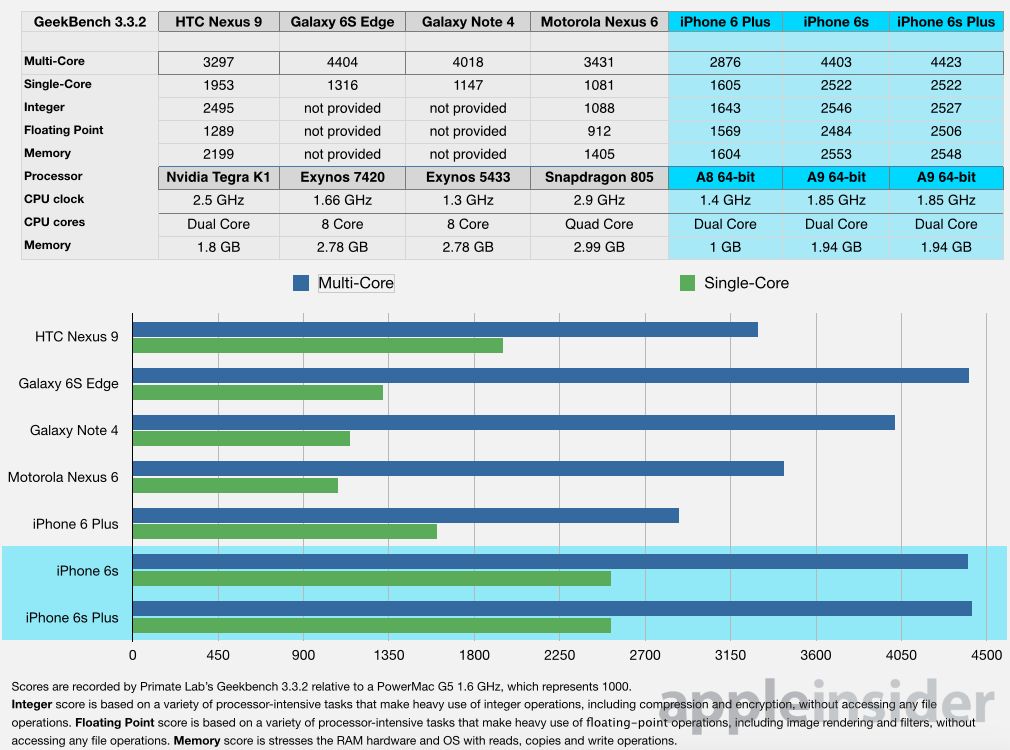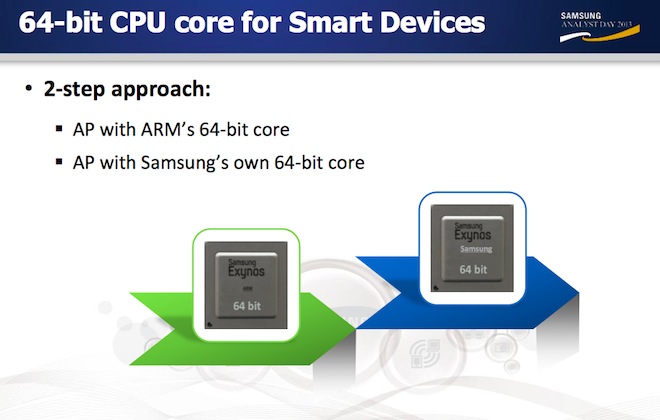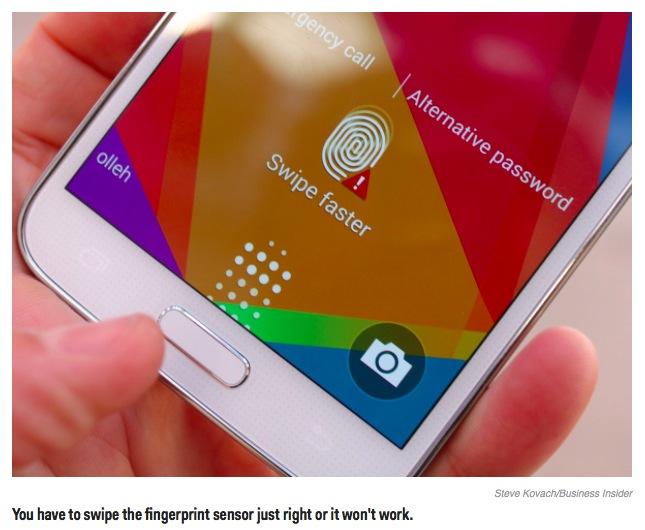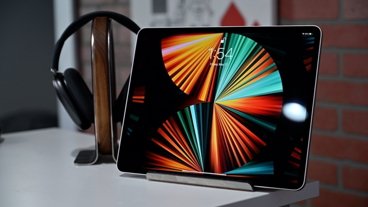Samsung Electronics has unveiled its new Exynos 8 Octa chip, combining its first custom 64-bit ARMv8 CPU core with the company's proprietary mobile baseband in the same package. But while claiming leadership, the new chip trails Apple in performance.
Samsung's existing high end chip, Exynos 7 Octa (as in 8 core), is already in use in the company's flagship Galaxy 6S Edge. Clocked at 1.66 GHz and equipped with 3GB of RAM, it turns in benchmark scores nearly as good as Apple's A9 powered iPhone 6s and 6s Plus, at least in multicore scores.
In single core scores, Samsung's current chip falls down considerably. A9 delivers single core performance that makes Apple's entry level iPhone 6s over 90 percent faster than Samsung's fastest Exynos 7 chip used in its premium-priced, limited availability Galaxy S6 Edge.
Multicore performance is exploited most often only in benchmark tests; most of the time, phones are riding on single core performance. That makes too many cores a liability, as they either have to be left idle or activated at the expense of battery life. Apple's two core chips provide faster performance when only one is in use, while also peaking to provide similar or better scores to 8 core chips on the market. Apple also has an easier time extending battery life, even when using smaller, lighter battery packages.
One small leap for Exynos 8, one giant leap for A9
Samsung isn't shipping products using its next Exynos 8 yet, but it has delivered a press release touting the upcoming chip as "a leading-edge application processor for next-generation mobile devices."Rather than advertising a 30 percent jump in performance, Apple states its A9 delivers 70 percent faster CPU performance and a 90 percent faster GPU
However, even the press release notes that Samsung expects only a "30 percent improvement in performance" over its existing Exynos 7 Octa architecture, despite incorporating the company's first generation of in-house 64-bit cores.
Samsung has previously used stock core designs created by ARM, just like Qualcomm. Apple introduced its first 64-bit cores in 2012 [correction: 2013] with the A7, catching the industry off guard. It's now on its third generation 64-bit architecture.
And rather than advertising a 30 percent jump in performance, Apple states its A9 delivers 70 percent faster CPU performance and a 90 percent faster GPU than its previous chip.
"We, as a market leader, are following the market trend"
Last year, Samsung executive Rhee In-jong bizarrely claimed to the Wall Street Journal that at Samsung, "we, as a market leader, are following the market trend" in delivering catch up technology that claimed to somehow also be first to market. He was speaking about Samsung's efforts to catch up with Apple's Touch ID.
A year earlier in 2013, Samsung's System LSI president Dr. Namsung Stephen Woo also presented a strange interpretation of time and sequence when claiming leadership in 64-bit mobile chips.
He was directly addressing the company's investors over the issue of Samsung's notable lack of 64-bit Application Processors, a year [correction: a few months] after Apple had introduced its A7.
"Many people were thinking 'why do we need 64-bit for mobile devices?'" Woo said, before outlining Samsung's two part strategy for catching up. It involved first using ARM's generic core reference design, before delivering a chip using its own custom 64-bit cores.
"We are marching ahead with the 64-bit offering, and even though it's a little too early, I think we are at the leader group in terms of 64-bit offerings," he claimed. However, his second step toward 64-bit is only now being readied for production in 2015, two years later— and three years [correction: over 2 years] behind the A7.
Even with a 30 percent improvement in processing power, the Exynos 8 Octa would conceptually deliver Geekbench scores that left existing iPhone 6s models about 48 percent faster in single core performance, even if Samsung retains the same higher clock speed and more RAM.
However, Apple also has a showoff chip of its own: A9X. It has single core performance that would be almost twice that of Exynos 8 Octa, and that chip (powering iPad Pro) has only two cores. It's gaining attention, not just for being faster than Samsung's mobile chips, but faster than some of Intel's processors designed for mobile hybrid tablet-laptops.
Some other problems for Samsung
Of course, Samsung hasn't even actually delivered its latest chip yet. Intending to meet certain goals and functionality aren't the same as delivering upon those plans. Samsung experienced this with its first attempt to take on Touch ID using inferior fingerprint scanning on the Galaxy S5 that reviews lambasted as problematic and quirky. That was the feature Samsung delivered alongside the line that the company was "leading by following" in biometric sensors.
But specific to its own chip designs, Samsung has also suffered through flaws in its processors. For example, Samsung shipped some versions of its Galaxy S4 using in-house Exynos 5 Octa chips (although most used Qualcomm Snapdragon processors).
While the media glowed over Samsung's Exynos 5 press release and analysts claimed that by using its own chips it would save tons of money and be difficult to compete against, the Exynos 5 suffered what AnandTech described as "a broken implementation of the CCI-400 coherent bus interface," with "implications [that] are serious from a power consumption (and performance) standpoint."
The news didn't get much attention, in part because "neither ARM nor Samsung LSI will talk about the bug publicly, and Samsung didn't fess up to the problem at first either - leaving end users to discover it on their own."
It also turned out that Samsung's Galaxy S4 models with the chip were more expensive to build, not less, even before including the costs involved with fixing the hardware bugs.
Samsung's latest flagship, the Galaxy S6 Edge, appears to have transitioned to Exynos chips exclusively. However, that was actually caused by another chip debacle: Qualcomm's own inability to deliver its first 64-bit chips without serious flaws and delays. Given Qualcomm's stature in the chip industry, that doesn't exactly bode well for Samsung's prospects of having a flawless launch.
Samsung also has other problems riding on top of its phone chip. Even if it were to develop and ship a chip as fast as Apple's A-series, it would still be hamstrung by the phone maker's dependence upon Android, which is notorious for hogging memory and processing resources.
Samsung's Galaxy S6 (and most other Android phones) shipped with full disk encryption turned off, because FDE under Android significantly taxes memory performance by 50 to 80 percent. Most modern Android phones still aren't fast enough to handle the encryption that iPhone 3GS had in 2008 [correction: 2009], partially the fault of hardware and party the fault of Google's software.Most modern Android phones still aren't fast enough to handle the encryption that iPhone 3GS had in 2009
A detailed review of video gaming on mobile platforms also noted that "iPhone games use around a quarter of the RAM of the Android games we tested," while Samsung's own contributions, including the use of ultra high resolution displays, tax the processor further without delivering real benefits, particularly in video games, which often simply downscale to a lower resolution to remain playable.
On top of the problems of Android, Samsung is also adding its own services and apps with serious, easy to exploit security flaws. Google volunteered to help clean up Samsung's latest Galaxy S6 Edge, and found 11 exploitable holes including "a substantial number of high-severity issues" within a week.
Of course, the biggest problem for Samsung is that it is competing against two fronts, with Apple taking up an increasing majority of the high end, while regional players in China displace its volume shipments and drive down prices in the mid and low end. That market position makes focusing on high performance chips like Exynos 8 Octa virtually irrelevant, because Samsung is having a very hard time selling many of the expensive phones that use them.
In contrast, the majority of iPhones that Apple sells are its newest model, creating vast economies of scale that drive down their cost and finance the next generation of ever faster and more sophisticated A-series processors.
 Daniel Eran Dilger
Daniel Eran Dilger









-m.jpg)






 Malcolm Owen
Malcolm Owen
 Amber Neely
Amber Neely


 Christine McKee
Christine McKee

 Chip Loder
Chip Loder
 Marko Zivkovic
Marko Zivkovic









39 Comments
They only way they can appear to be competing is by adding cores and increasing the clock rate. I wonder how well they would do if the metrics were equalized.
Apple is just killing it on the CPU & GPU front lately. Present day iPhones and iPads are pretty damn powerful, can you imagine how powerful iPhones and iPads will be next year and the following year?
And no, not even an ignorant and delusional Fandroid holding their brand new pathetic 8 core Android phone will change that fact. Everybody else should just throw in the towel. They are no match for Apple.
The only way Samsung can compete with Apple is by cheating on benchmark scores like they have in the past. Speaking of Samsung, it sounds like they took a page out of Volkswagen's cheating handbook. Apparently Samsung has been using software to cheat on power consumption tests on their TV's.
Apple is just killing it on the CPU & GPU front lately. Present day iPhones and iPads are pretty damn powerful, can you imagine how powerful iPhones and iPads will be next year and the following year?
And no, not even an ignorant and delusional Fandroid holding their brand new pathetic 8 core Android phone will change that fact. Everybody else should just throw in the towel. They are no match for Apple.
I imagine the baton will keep passing from phone to phone, chip to chip in terms of what is 'best' performance wise (benchmark or real world). That's only natural. Lack of competition = stagnation.
Samsung's actions remind me of how insecure people behave. To be a participant in the conversation of the moment, Samsung announced a new chip. When the chip is put under the early microscope, the chip is found lacking. Apple's A9X chip is the chip of conversation versus Intel chips. Samsung is in the conversation because of its rushed announcement. The inclusion will fade quickly.